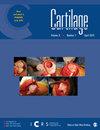BMSC-Derived Exosomes Attenuate Rat Osteoarthritis by Regulating Macrophage Polarization through PINK1/Parkin Signaling Pathway
IF 2.7
4区 医学
Q1 ORTHOPEDICS
引用次数: 0
Abstract
ObjectiveExosomes derived from bone marrow mesenchymal stem cells (BMSC-Exos) may modulate the M1/M2 polarization of macrophages during osteoarthritis (OA). However, the underlying mechanisms of BMSC-Exos in this process still need to be elucidated. In this study, we explored the role of BMSC-Exos in the polarization of macrophages in vitro and the OA rats in vivo.MethodsThe effects of BMSC-Exos on RAW264.7 cells were determined, including the production of reactive oxygen species (ROS) and the protein expression of Akt, PINK1, and Parkin. We prepared an OA model by resecting the anterior cruciate ligament and medial meniscus of Sprague–Dawley (SD) rats. Hematoxylin-eosin (H&E) and safranin O-fast green staining, immunohistochemistry and immunofluorescence analyses, and the examination of interleukin 6 (IL-6), interleukin 1β (IL-1β), tumor necrosis factor alpha (TNF-α), and interleukin 10 (IL-10) were performed to assess changes in cartilage and synovium.ResultsBMSC-Exos inhibited mitochondrial membrane damage, ROS production, and the protein expression of PINK1 and Parkin. Akt phosphorylation was downregulated under lipopolysaccharide (LPS) induction but significantly recovered after treatment with BMSC-Exos. BMSC-Exos alleviated cartilage damage, inhibited M1 polarization, and promoted M2 polarization in the synovium in OA rats. The expression of PINK1 and Parkin in the synovium and the levels of IL-6, IL-1β, and TNF-α in the serum decreased, but the level of IL-10 increased when BMSC-Exos were used in OA rats.ConclusionBMSC-Exos ameliorate OA development by regulating synovial macrophage polarization, and one of the underlying mechanisms may be through inhibiting PINK1/Parkin signaling.BMSC 衍生的外泌体通过 PINK1/Parkin 信号通路调节巨噬细胞极化,从而减轻大鼠骨关节炎
目的 从骨髓间充质干细胞(BMSC-Exos)中提取的小体可能会调节骨关节炎(OA)期间巨噬细胞的M1/M2极化。然而,BMSC-Exos在这一过程中的内在机制仍有待阐明。方法测定 BMSC-Exos 对 RAW264.7 细胞的影响,包括活性氧(ROS)的产生以及 Akt、PINK1 和 Parkin 蛋白的表达。我们通过切除 Sprague-Dawley (SD)大鼠的前十字韧带和内侧半月板制备了 OA 模型。通过血红素-伊红(H&E)和黄绿素-O-快绿染色、免疫组织化学和免疫荧光分析,以及白细胞介素6(IL-6)、白细胞介素1β(IL-1β)、肿瘤坏死因子α(TNF-α)和白细胞介素10(IL-10)的检测来评估软骨和滑膜的变化。结果BMSC-Exos抑制了线粒体膜损伤、ROS产生以及PINK1和Parkin的蛋白表达。在脂多糖(LPS)诱导下,Akt磷酸化下调,但经BMSC-Exos处理后,Akt磷酸化明显恢复。BMSC-Exos 可减轻 OA 大鼠滑膜的软骨损伤,抑制 M1 极化,促进 M2 极化。结论 BMSC-Exos 通过调节滑膜巨噬细胞的极化来改善 OA 的发展,其潜在机制之一可能是通过抑制 PINK1/Parkin 信号传导。
本文章由计算机程序翻译,如有差异,请以英文原文为准。
求助全文
约1分钟内获得全文
求助全文
来源期刊

CARTILAGE
ORTHOPEDICS-
CiteScore
6.90
自引率
7.10%
发文量
80
期刊介绍:
CARTILAGE publishes articles related to the musculoskeletal system with particular attention to cartilage repair, development, function, degeneration, transplantation, and rehabilitation. The journal is a forum for the exchange of ideas for the many types of researchers and clinicians involved in cartilage biology and repair. A primary objective of CARTILAGE is to foster the cross-fertilization of the findings between clinical and basic sciences throughout the various disciplines involved in cartilage repair.
The journal publishes full length original manuscripts on all types of cartilage including articular, nasal, auricular, tracheal/bronchial, and intervertebral disc fibrocartilage. Manuscripts on clinical and laboratory research are welcome. Review articles, editorials, and letters are also encouraged. The ICRS envisages CARTILAGE as a forum for the exchange of knowledge among clinicians, scientists, patients, and researchers.
The International Cartilage Repair Society (ICRS) is dedicated to promotion, encouragement, and distribution of fundamental and applied research of cartilage in order to permit a better knowledge of function and dysfunction of articular cartilage and its repair.
 求助内容:
求助内容: 应助结果提醒方式:
应助结果提醒方式:


